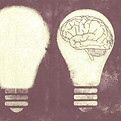Nutrition and Health

How Food Effects the Brain
The physical affects of your diet are somewhat apparent, but did you know that your diet can impact you psychologically?
Research shows that diet can have an impact on learning, memory, risk of neurological disorders and even mental health.

Cognition
Cognition is related to understanding and intellect. Brain fog and impaired cognitive ability can be linked to nutrient deficiencies including iron and B vitamins.

Neurological Implications
Folate and their related B-vitamins support brain development and function from infancy all the way into our final years of life.
These micro-nutrients help protect developing brains from neural tube defects and aging brains from dementia and Alzheimer's disease

Whole Food
Rather than reaching for a supplement, we recommend meeting nutrient needs by eating a balanced diet. Please visit www.myplate.gov for information on eating a balanced diet

Why are B vitamins important?
There are 8 B vitamins; they each have various functions and food sources.
In general, B vitamins are responsible for cellular and metabolic processes including the breakdown of macro-nutrients (carbs, fats and proteins.) Some are also involved in DNA maintenance.
B vitamins can be found in various whole foods including meat, fish, milk, eggs, whole grains, nuts, fortified cereals and some fruits an vegetables.
